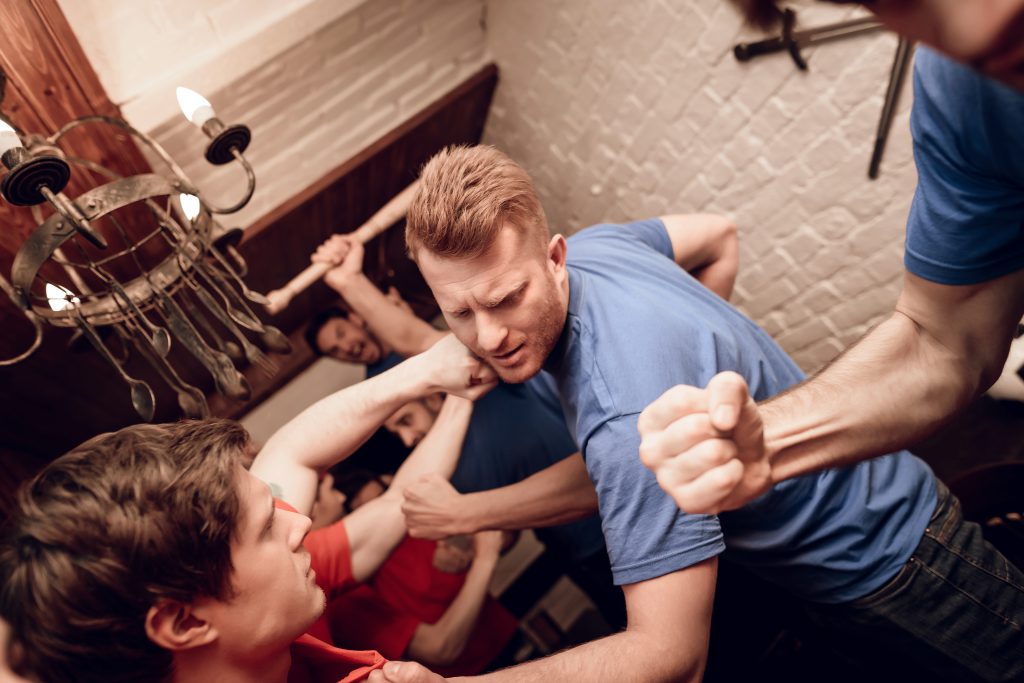Disorderly conduct accuses a person of inappropriately disruptive behavior. Things like yelling at someone or bumping into people can result in one being arrested for disorderly conduct. If you or a loved one has been charged with disorderly conduct in New Jersey, it is urgent that you understand the potential penalties and contact an experienced attorney who can help you deal with your charges, possibly getting them reduced or waived completely.
 What is Disorderly Conduct?
What is Disorderly Conduct?
Under N.J.S.A. 2C:33-2, disorderly conduct is a petty disorderly persons offense and is charged in two ways.
Improper Behavior [2C:33-2(a)]: This can apply to a person who purposely causes a public inconvenience (by fighting, for example), or who creates a public risk through reckless behavior that serves no legitimate purpose.
- Although this is prosecuted much less often, a person can be convicted of disorderly conduct due to uttering offensive language in public with the purpose of offending the hearer. Also, even if the person does not intend to offend the hearer but acts in reckless disregard of doing so, he/she can still be convicted.
In this context, “public” means a place where a substantial group of people has access. This may include:
- Highways
- Transport facilities
- Schools
- Prisons
- Apartment houses
- Neighborhoods
- Places of business or entertainment (i.e., concert hall or stadium)
Examples of Disorderly Conduct
Any kind of aggressive or wild behavior that serves no purpose other than to annoy or upset another person could result in a charge of disorderly conduct. Examples of disorderly conduct include:
- Being drunk in public
- Fighting or harassing people in a bar or stadium
- Loitering on the streets
- Making loud or disturbing noises
- Making offensive gestures at people
- Damaging public or private property
- Jumping on a table or bar
- Pushing or shoving another person, screaming aggressively in a person’s face, and similar sorts of behavior
 Penalties and Fines
Penalties and Fines
Being convicted of disorderly conduct is much more serious than most think. Disorderly conduct is akin to a misdemeanor in most other states. Although it is called a “petty disorderly persons offense,” it will appear on one’s criminal record and can lead to up to 30 days in jail and a fine of up to $500. If the actions in question caused any damage to property, the judge can require the person pay restitution—i.e. to pay for repairs or replacement of the property. Like many criminal offenses, a conviction for disorderly conduct can be a red flag for many employers. It can also limit options for college and housing.
 How To Beat Disorderly Conduct
How To Beat Disorderly Conduct
Remember, everyone has constitutional rights that cannot be taken away. Just like a police officer cannot search a person simply because he wants to, he/she cannot arrest someone without an extremely good reason for doing so.
Everyone has a First Amendment right to freedom of speech. As such, as long as the words uttered do not incite an immediate breach of the peace, an officer will have a very hard time justifying an arrest for disorderly conduct due to using offensive language. This means that the prosecution will bear a heavy burden of proof whenever they try to convict someone of disorderly conduct due to uttering offensive language.
Not only can an experienced defense attorney be able to help raise this defense, but he/she can also diffuse a prosecutor’s case altogether by providing concrete evidence for why those words did not bring about or incite an immediate breach of the peace. Moreover, when it comes to disorderly conduct due to improper behavior, a good criminal defense attorney will be able to show the court that the client’s actions had a legitimate purpose and do not warrant a conviction. In many cases, it is wisest to negotiate with prosecutors to reduce the charge to a lesser offense that will not result in a criminal record.
 Consequences for a First Offense
Consequences for a First Offense
As a petty disorderly persons offense, the potential jail sentence is small–only 30 days. However, unless the charge is coupled with other, more serious charges (e.g. aggravated assault), a first-offense of disorderly conduct is unlikely to result in jail time. This is known as a presumption of non-incarceration.
This doesn’t mean that judges don’t take this offense seriously. Rather, they recognize that things just got a little out of control. In the scheme of things, probation and a fine are often sufficient punishment.
While avoiding jail time is a good thing, it does not mean that the defendant has gotten off easy. The simple fact of being convicted for disorderly conduct still means having a criminal record that can affect one’s livelihood. As such, it is critical to hire an attorney to defend against a disorderly conduct charge.

 Consequences for Juveniles
Consequences for Juveniles
Kids under the age of 18 often have a lot of energy to work out, which can result in impulsive actions and aggressive language. If this behavior crosses the line in a public setting, it can lead to a charge of disorderly conduct. Juveniles charged with a minor crime will have their cases heard in Family Court. While these judges are used to dealing with kids, it is the job of a skilled defense attorney to carefully explain the difference between a child innocently acting out and one who is engaging in “tumultuous” or disruptive behavior. An attorney can explain the circumstances and present the facts in such a way so as to have the best chance of avoiding a conviction.
 How to Defend a Disorderly Conduct Charge
How to Defend a Disorderly Conduct Charge
Remember, everyone has constitutional rights that cannot be taken away. Just like a police officer cannot search a person simply because he wants to, he/she cannot arrest someone without an extremely good reason for doing so.
Everyone has a First Amendment right to freedom of speech. As such, as long as the words uttered do not incite an immediate breach of the peace, an officer will have a very hard time justifying an arrest for disorderly conduct due to using offensive language. This means that the prosecution will bear a heavy burden of proof whenever they try to convict someone of disorderly conduct due to uttering offensive language.
Not only can an experienced defense attorney be able to help raise this defense, but he/she can also diffuse a prosecutor’s case altogether by providing concrete evidence for why those words did not bring about or incite an immediate breach of the peace. Moreover, when it comes to disorderly conduct due to improper behavior, a good criminal defense attorney will be able to show the court that the client’s actions had a legitimate purpose and do not warrant a conviction. In many cases, it is wisest to negotiate with prosecutors to reduce the charge to a lesser offense that will not result in a criminal record.
Enrolling in NJ Diversionary Programs
A person who is charged with disorderly conduct may be able to avoid a conviction by entering a diversionary program.
Carry Order
- In cases involving this and other petty offenses, an attorney could request a “carry order.” This is a request for the judge to delay the case for 60 to 90 days while the defendant seeks counseling. This could be anger management or alcohol/drug counseling, depending on the defendant’s situation. At the end of the carry period, if the defendant submits proof of the counseling and has remained arrest-free during that time, the charges can be dropped–no conviction, no criminal record.
 Expunge Disorderly Conduct
Expunge Disorderly Conduct
As a petty offense, disorderly conduct can be cleared from one’s criminal record if the individual in question is otherwise eligible. A person can have his/her criminal record expunged if it has 5 or fewer disorderly persons convictions, or 3 or fewer disorderly persons convictions and no more than 1 indictable (felony) offense conviction. Note that some offenses, such as violent crimes and domestic violence-related crimes can make a record ineligible for expungement. For more information on expunging a criminal record in New Jersey, read our information page and contact an attorney for help.
 Case Law Analysis
Case Law Analysis
 Who Should I Contact?
Who Should I Contact?
If you or a loved one has been cited for disorderly conduct and/or any other criminal offense in New Jersey, contact an attorney for help. The lawyers at Rosenblum Law are skilled criminal defense attorneys who can help protect your right to express yourself and mitigate the consequences of the charge. Email Rosenblum Law or call 888-815-3694 today for a free consultation about your case.
 Frequently Asked Questions
Frequently Asked Questions
Yes, a disorderly conduct conviction in the state can result in up to 30 days behind bars, in addition to any other charges that may be filed against the individual for similar or related actions.
Disorderly conduct and being adjudicated a disorderly person are two different things, although they can overlap. A “disorderly person” is a person who has been convicted of a disorderly person’s offense in New Jersey, which is equivalent to a misdemeanor. Disorderly conduct is a specific type of petty disorderly persons offense.
Depending on the language used and other circumstances, swearing at a cop could be a form of protected First Amendment speech. However, threatening or violent language that could make an officer feel unsafe can result in a charge of disorderly conduct.
The statute of limitations for disorderly persons offense (or petty disorderly persons offense) is one year from the time the alleged crime is committed.






 888-815-3649
888-815-3649
